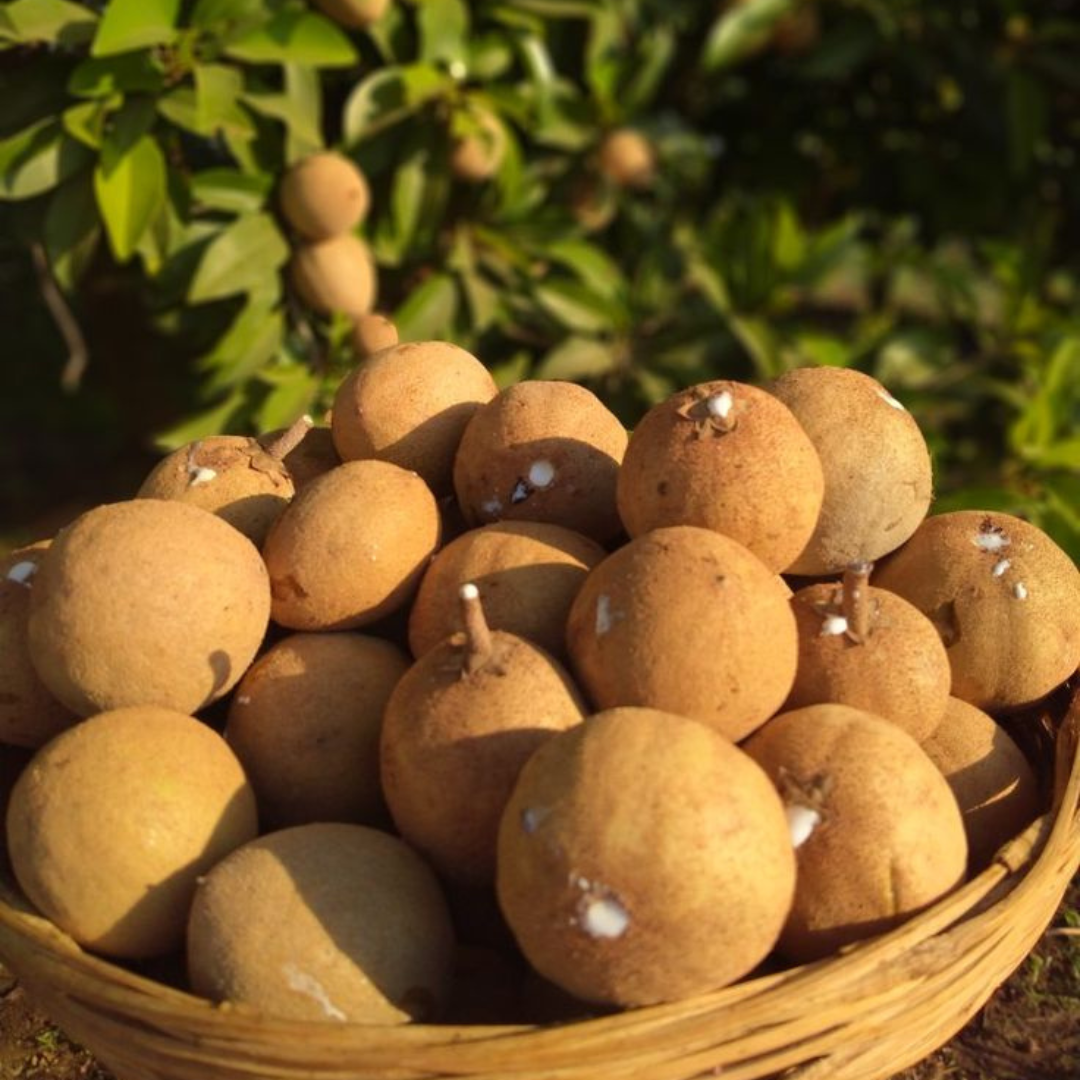During pregnancy, dietary choices play a pivotal role in nurturing both the mother and the growing baby. Chikoo, also known as Sapota, emerges as a delightful addition to an expectant mother’s diet owing to its rich nutritional profile. Brimming with essential vitamins, minerals, and natural sweetness, Chikoo offers a natural dose of nutrients beneficial for the overall well-being of both the mother and the developing baby. Let's explore the various facets of this nutrient-packed fruit and its advantages during pregnancy.
Chikoo Chronicles: Unveiling the Nutritional Marvel in Pregnancy
Chikoo, also known as Sapota, stands as a delightful tropical fruit, and its inclusion in a pregnancy diet brings forth a spectrum of nutritional benefits. Rich in essential nutrients and vitamins, this delectable fruit offers expecting mothers a natural source of goodness.
Let's delve into the world of Chikoo during pregnancy to uncover its nutritional advantages, potential concerns, and why it's a sweet addition to the expectant mom's diet.
- Vitamins and Minerals Galore: Chikoo, packed with vitamins A, C, and E, contributes to immune system support, ensuring a robust defense mechanism against infections. Its high mineral content, particularly potassium and magnesium, aids in maintaining electrolyte balance and supporting muscle function.
- Fiber for Digestive Health: A rich source of dietary fiber, chikoo helps regulate bowel movements and prevent constipation, a common issue during pregnancy.
- Energy Boost: The natural sugars present in chikoo provide an instant energy boost, combating fatigue that often accompanies pregnancy.
- Folate for Fetal Development: Chikoo is a good source of folate, essential for the development of the baby's neural tube and preventing certain birth defects.
- Antioxidant Properties: The fruit's antioxidant properties help in neutralizing free radicals, promoting overall well-being for both the mother and the baby.
Including chikoo in a balanced diet can contribute positively to the nutritional needs of expectant mothers, but moderation is key. Always consult with a healthcare professional for personalized dietary advice during pregnancy.
Chikoo Through the Trimesters: A Nutritional Tale for Mom and Baby
Chikoo, also known as sapota, emerges as a nutritional ally for both expecting mothers and their babies across the trimesters of pregnancy. This nutrient-rich fruit boasts a wealth of vitamins, minerals, and dietary fiber, serving as a delicious addition to a healthy diet during this crucial period. With its sweet taste and nutritional prowess, Chikoo stands as a delightful and beneficial choice for moms-to-be seeking a wholesome and enjoyable way to boost their nutritional intake, supporting the well-being of both mom and baby.
Here's a trimester-wise breakdown of why this sweet fruit is a superhero for expectant mothers:
First Trimester: Nurturing Early Development with Chikoo
In the initial trimester, chikoo contributes to early development:
- Nutrient Powerhouse: Chikoo is laden with essential nutrients like vitamin C, vitamin A, calcium, and iron. These nutrients play a fundamental role in kickstarting the baby's growth and development.
- Morning Sickness Relief: Its mild flavor and soothing properties might alleviate the discomfort associated with morning sickness, making it a gentle option to settle the stomach.
- Energy Booster: Chikoo's natural sugars provide a quick energy lift, which could help counter early pregnancy fatigue, providing a natural energy source.
- Hydration Support: With its high water content, chikoo contributes to maintaining hydration levels, crucial for the early phases of pregnancy.
Integrating chikoo into the first-trimester diet may offer a nutritional boost for early fetal development. However, always consult with your healthcare provider regarding dietary changes during pregnancy to ensure they align with your specific health needs.
Chikoo's Role in the Second Trimester: A Nutrient Powerhouse
During the second trimester, chikoo offers an array of benefits:
- Rich in Nutrients: Chikoo is packed with vital nutrients like vitamin C, vitamin A, calcium, and iron. These nutrients play a pivotal role in developing the baby's bones, vision, and immune system.
- Digestive Aid: Its high fiber content aids in alleviating constipation, a common discomfort during pregnancy, promoting healthy digestion.
- Energy Boost: The natural sugars in chikoo provide a quick energy lift, combating the fatigue often experienced during this stage of pregnancy.
- Hydration Source: Chikoo's high water content contributes to maintaining hydration levels, crucial for sustaining amniotic fluid levels.
Incorporating chikoo into the second-trimester diet can be refreshing and nutritionally beneficial. However, moderation is essential due to its natural sugars. Always consult your healthcare provider before making significant dietary changes during pregnancy.
Chikoo: A Nutritional Powerhouse in the Third Trimester
During the third trimester, chikoo continues to offer several benefits:
- Immunity Boost: Rich in vitamins and antioxidants, chikoo supports the immune system, benefiting both the expecting mother and the baby.
- Digestive Aid: Its fiber content aids in maintaining regular bowel movements, alleviating common digestive issues encountered in the final stages of pregnancy.
- Energy Booster: The natural sugars in chikoo provide a quick energy lift, combating fatigue, a prevalent concern in the later stages of pregnancy.
- Nutrient-Rich: Chikoo's array of vitamins and minerals contributes to overall nourishment, crucial for the baby's growth and development.
However, moderation is key as excessive consumption might elevate sugar levels. Always consult your healthcare provider before making significant dietary changes during pregnancy.
Chikoo Chronicles: Savvy Safeguards for Mama's Munching Journey
It's often advised to be cautious with chikoo (sapota) during pregnancy due to a few reasons:
- Latex Content: Chikoo contains latex, which can sometimes trigger allergic reactions or sensitivity. Ingesting too much latex might lead to adverse effects like stomach issues or allergies, which could be a concern during pregnancy.
- Natural Sugars: Chikoo is naturally high in sugars. Although natural, excessive sugar intake, even from fruits, might lead to gestational diabetes or affect blood sugar levels, especially if consumed in large quantities.
- Risk of Contaminants: Contamination risks are associated with consuming certain fruits during pregnancy. Chikoo might carry contaminants if not washed properly, which could pose health risks.
Always consult a healthcare professional before making significant dietary changes during pregnancy. They can provide personalized advice based on your health and pregnancy status.
Chikoo Creations: Irresistible Recipes Tailored for Expectant Taste Buds
Here are three safe and delightful chikoo recipes suitable for pregnant women:
1. Chikoo Milkshake:
- Peel and chop ripe chikoos.
- Blend the chikoo chunks with chilled milk and a dash of honey or sugar (optional) until smooth.
- Add a pinch of cardamom powder for a fragrant twist.
- Serve chilled.
2. Chikoo Salad:
- Dice ripe chikoos and mix them with sliced bananas, chopped apples, and a handful of nuts (like almonds or walnuts).
- Drizzle with a light honey-lemon dressing or a sprinkle of chaat masala for flavor.
- Toss gently and serve as a refreshing salad.
3. Chikoo Popsicles:
- Puree peeled chikoos in a blender and strain to remove any fibers.
- Pour the chikoo puree into popsicle molds and add slices of fresh fruits like strawberries or kiwi for variation.
- Freeze until solid, and enjoy a healthy, icy treat.
Remember to consult with your healthcare provider before adding new foods to your pregnancy diet.
Embracing a Nutrient-Rich Pregnancy Journey with Chikoo
In wrapping up our exploration of chikoo (Sapota) during pregnancy, it's essential to note the significance of making informed dietary choices for both mom and baby. While chikoo offers numerous nutritional benefits, it's crucial to consume it in moderation and adhere to any precautionary measures recommended by healthcare providers during pregnancy.
Speaking of making mindful choices, brands like A Toddler Thing stand out by not only offering quality products but also championing sustainability. Their commitment to eco-friendly practices reflects a shared responsibility toward a healthier future for our children. From their range of thoughtfully curated essentials to their dedication to sustainable approaches, supporting brands like A Toddler Thing aligns with the values of responsible parenting and a greener planet.
Remember, consulting healthcare professionals for dietary guidance and embracing balanced, nutritious choices is key throughout your pregnancy journey. Consider incorporating chikoo sensibly and explore sustainable options that resonate with your values for a healthier, brighter future for you and your little one.





